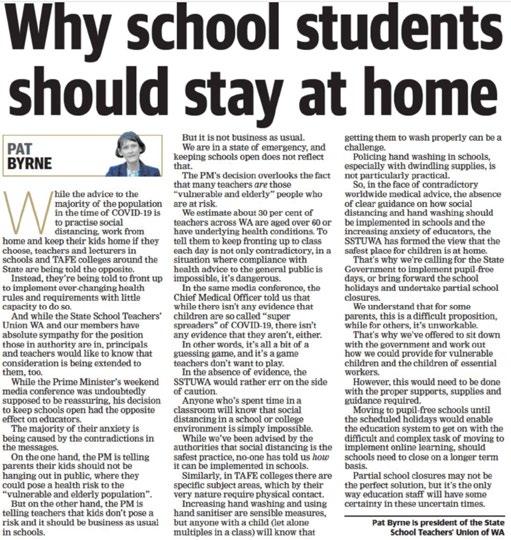
3 minute read
Aboriginal Cultural Standards Framework
By Minh Lam
Advertisement
The Aboriginal Cultural Standards Framework (ACSF) sets standards for Department of Education (DoE) staff in their approach towards the education of Aboriginal students and their dealings with students, their families and the community. It aims to increase Aboriginal student achievement and drive improvement planning, and is aligned with the Australian Professional Standard for Principals and Australian Professional Standards for Teachers. The framework also sets out to develop a respect and understanding for Aboriginal people, culture and history amongst staff and students. “The framework comprises five cultural standards and a continuum,” states the DoE on its website. “The continuum enables staff to reflect on individual and whole-school progress, and to develop ways to move towards becoming culturally responsive. A school or an individual may be at different stages of development across each standard and this can be influenced by the individual’s particular experiences and location. Together, the standards and continuum
ETC support for ACSF
The SSTUWA Education and Training Centre offers training courses that may support schools implementing the Aboriginal Cultural Standards Framework. These are online learning events. For more information visit sstuwa.org.au/training
Including and Developing Knowledge of Aboriginal Perspectives in Daily Practice Tuesday 16 June: 3-4pm
Incorporating Aboriginal perspectives into the curriculum can be daunting for many teachers. It is particularly hard to know where to start, especially for those who don’t feel they have a lot of knowledge assist school leaders to start discussions with their staff and communities about planning for improvement in their schools.” According to the DoE, the ACSF is not a compliance checklist and schools are not expected to have a strategy for performance descriptors under the framework. The DoE states it is a self-reflection aid to identify and address issues most relevant or urgent for schools in their attempts to create high-quality learning environments for Aboriginal students. The ACSF has been in place for three years and schools are expected to implement the framework as part of its school improvement planning process. The current school review process reflects these domains. This year, the focus of implementation is on cultural responsiveness, in the classroom and via school leadership. The classroom deals with responsive curriculum and pedagogy; how to interact with people from different cultural backgrounds and building mutually respectful relationships that value the strength of the local Aboriginal community.
and confidence to speak with authority. This session will explore and develop knowledge in a way that encourages everyone to be creative and have a go. It will also identify networks that can be accessed to draw on expertise and resources that are readily available.
Understanding Treaty within the Education Community Tuesday 8 September: 3-4pm
Working towards treaty is a major undertaking for society and has implications for how we operate within the education community in a tolerant, understanding and informed way. This session will explore what the assembly is, what the inaugural plan is and how this can be incorporated into planning documentation to ensure there are explicit According to the DoE, culturally responsive leadership aligns the school vision and ethos with the needs of students and expectations of the local Aboriginal community. The ACSF comes amongst the backdrop of decades-failed attempts to advance the educational and wider health, social outcomes of Aboriginal people. Successive government policies tried to exclude the Aboriginal population participation in Australian society or took away ownership of their own lives, cutting connections to land, language, culture and communities. Within schools, educators have to navigate through a myriad of issues that impact on Aboriginal student learning including intergenerational trauma, disadvantage, poverty, as well as having English as an additional language/dialect or conditions such as conductive hearing loss. Schools are encouraged to focus on a few key priorities matched to their school community. For support, the Aboriginal Education Teaching and Learning Directorate is available for advice and guidance.
links to education within the learning environment.
Both sessions will be conducted by Gina Milgate
Gina has led a diverse career at the Australian Council for Educational Research, with almost 11 years as a research fellow in Indigenous Education. She advises on national policies regarding reconciliation and Indigenous learning, and hosts workshops such as the current Indigenous Leadership Program for women in early childhood and pedagogical research. Gina presents at conferences throughout Australia and internationally, and is a published author. Gina’s passion and goals for the future revolve around research that empowers the Indigenous community.








